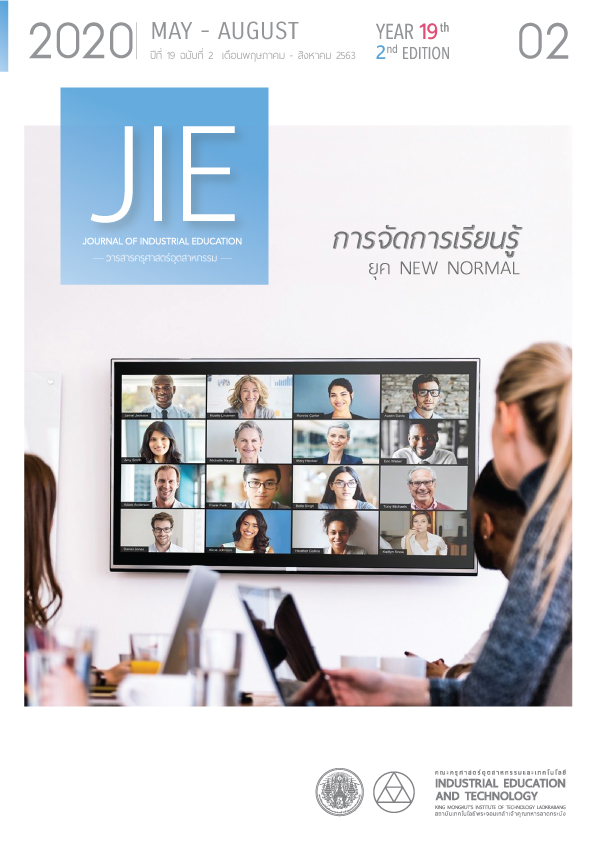THE DEVELOPMENT OF PROGRAMMING SKILLS WITH PLOBLEM-BASED LEARNING METHOD TOGETHER WITH E-LEARNING COURSEWARE ON SELECTION STRUCTURE PROGRAMMING FOR GRADE 7 STUDENTS
Keywords:
E-Learning, Problem-based Learning, Programming Skills, Selection Structure ProgrammingAbstract
The objective of this research was to compare students’ programming skills between using problem-based learning together with e-learning courseware on condition programming and traditional learning. The samples used were 72 grade 7 students studying in science program classroom in Phanatpittayakarn School. The samples were selected by using cluster random sampling technique with two groups. The main research instruments were: 1) the lesson management plan using problem-based learning method together with e-learning courseware on selection structure programming; 2) the e-learning courseware on selection structure programming; and 3) the programming skills lab test. The research results were statistically analyzed with mean, standard deviation, and pooled-variance independent t-test. The research results showed that: 1) the quality of the lesson management plan using problem-based learning method together with e-learning courseware on selection structure programming was at great level ( = 4.64, S.D. = 0.48); 2) the quality of the e-learning courseware on selection structure programming with the content topic was at great level (
= 4.60, S.D. = 0.52), the media design topic was at great level (
= 4.71, S.D. = 0.49) and the efficiency E1/E2 was 79.13/78.89; and 3) the programming skills of students using problem-based learning together with e-learning courseware on selection structure programming was higher than students using traditional learning with statistical significance at the level of .05.
References
Office of the National Economic and Social Development Board. 2016. The Twelfth National Economic and Social Development Plan (2017-2021). Bangkok: Office of the Prime Minister.
Office of the Education Council. 2017. The National Education Plan (2017-2026). Bangkok: Ministry of Education.
Sukon Sintapanon. 2015. New Generation Teacher’s Learning Management for Development of Students’ 21st Century Skills. Bangkok: 9119 Technic Printing.
Polgrit Rintarueg. 2015. Programming and Thinking Skills Development. Retrieved March 30, 2020, from http://oho.ipst.ac.th/programming-and-thinking-skills/?fbclid=IwAR2MPmaR_DDwgU8qrdQdmX4hbJIbP2tHzEmlpyZAYXdvLizEx_x9HWzWUQA
Tu, J.J., and Johnson, J.R. 1990. Cancomputer Programming Improve Problem-Solving Ability? ACM SIGCSE Buletin. 22(2). p. 30-37.
Puttiwan Chuangpitak. 2018. Lesson Management Plan : Enjoy with Programming Subject, 2nd Semester, Year of Education 2018. Chon Buri: Phanatpittayakarn School.
Anusorn Pitiwong. 2019. Lesson Management Plan : Robot Subject, 1st Semester, Year of Education 2019. Chon Buri: Phanatpittayakarn School.
Burachai Sirimahasakorn. 2004. Student-centered Lesson Plan. 2nd edition. Bangkok: Book Point.
Office of the Education Council. 2007. Problem-based Learning. Bangkok: Ministry of Education.
Raveewat Siriphuban. 2008. Guideline for Quality Lesson Management Plan Development. Academic Journal. 11(2). p. 19-23.
Vandee Sangprateeptong. 2019. Development and Quality Evaluation of Cognitive Measurement Instruments. Development of Cognitive Measurement Instruments. 7th edition. Nontha Buri: Sukhothai Thammathirat Open University.
Pisit Tuntavanitch. 2015. Taxonomy of Education Objectives, Cognitive Domain Based on The Concept of Benjamin S. Bloom : Revision Edition. Lampang Rajabhat University Journal. (2). p. 13-25.
Branson, R.K., Rayner, G.T., Cox J.L., Furman, J.P., King, F.J., and Hannum, W.H. 1975. Interservice prodedures for instructional systems development: Executive summary and model. Tallahassee: Florida State University.
Nutthakorn Songkram. 2011. Designing and Development of Multimedia for Learning. 2nd edition. Bangkok: Chulalongkorn University Press.
Chaiyong Brahmawong. 2013. Developmental Testing of Media and Instructional Package. Silpakorn Educational Research Journal. 5(1). p. 7-20.
Suwimon Wongwanich. 2016. Development of Psychomotor Measurement Instuments. Development of Affective and Psychomotor Instruments. 4th edition. Nontha Buri: Sukhothai Thammathirat Open University.
Nithipattara Balsiri. 2014. Principle of Educational Measurement and Evaluation. 2nd edition. Bangkok: O.S. Printing House.
Kamonwan Tangdhanakanond. 2016. Planning of Psycomotor Measurement Instruments Development. Development of Affective and Psychomotor Instruments. 4th edition. Nontha Buri: Sukhothai Thammathirat Open University.
Wannakarn Boonyok, Sirirat Petsangsri, and Krissana Kiddee. 2018. The Development of Online Learning Using Flipped Classroom to Enhance Learning Achievement on Presentation Using Computer Software for Grade 10 Students. Journal of Industrial Education. 17(2). p. 32-40.
Nawaphat Kemkaman, Krissana Kiddee, and Somkiat Tuntiwongwanich. 2015. Effect of Flipped Classroom Instruction with E-Learning Courseware on Achievement of Information Technology II Subject for Tenth Grade Students. Journal of Industrial Education. 14(3). p. 615-622.
Settawoot Molanil, Peerawut Suwanjan, and Pariyaporn Tungkunanan. 2016. The Blended Learning on C Programming for Grade 9 in Debsirin School. Journal of Industrial Education. 15(2). p. 10-17.
Puttiwan Chuangpitak, Thiyaporn Kantathanawat, and Pariyaporn Tangkunanan. 2017. Development of Flipped Classroom with Active Learning via E-Learning in Presenting Information Using Technology for High School. Journal of Industrial Education. 16(2). p. 89-96.
Weena Poophasuk, and Somsak Apibalsri. 2013. Computer Multimedia with Problem-based Learning in Science Subject to Enhance Problem Solving Ability of Matthayomsuksa 2 Students. Ratchaphruek Journal. 10(2). p. 75-82.
Supot Dorkjankang, Chaiyot Ruangsuwan, and Tharat Arreerard. 2014. Effects of Learning through Blended Web-based Instruction Based on the Problems by Using Problem-based Learning Entitled “Information and Communication Technology” of Grade 8th Students. Rajabhat Maha Sarakham University Journal (Humanities and Social Sciences). 8(2). p. 149-158.
Downloads
Published
How to Cite
Issue
Section
License
"The opinions and contents including the words in papers are responsibility by the authors."
"ข้อคิดเห็น เนื้อหา รวมทั้งการใช้ภาษาในบทความถือเป็นความรับผิดชอบของผู้เขียน"



